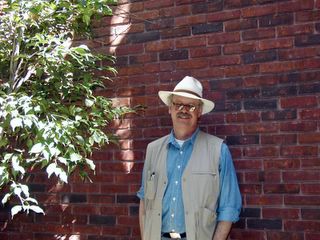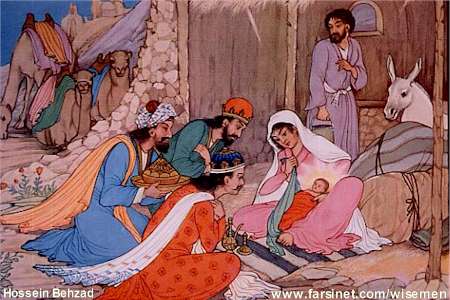
Just proof that I can indeed smile. Well, a little.

...and the Damned Fool. A curmudgeonly review of life, the universe, and everything... including, as appropriate, The Good News. A proud member of the True Reason Community.
\The*oph"a*ny\, n.; pl. {-nies}. [Gr. ?; ? God + ? to appear.]
A manifestation of God to man by actual appearance, usually
as an incarnation.
\The*ol"o*gy\, n.; pl. {Theologies}. [L. theologia, Gr.
?; ? God + ? discourse: cf. F. th['e]ologie. See {Theism},
and {Logic}.]
The science of God or of religion; the science which treats
of the existence, character, and attributes of God, his laws
and government, the doctrines we are to believe, and the
duties we are to practice; divinity; (as more commonly
understood) ``the knowledge derivable from the Scriptures,
the systematic exhibition of revealed truth, the science of
Christian faith and life.''
Many speak of theology as a science of religion
[instead of ``science of God''] because they disbelieve
that there is any knowledge of God to be attained.
--Prof. R.Flint (Enc.Brit.).
Theology is ordered knowledge; representing in the
region of the intellect what religion represents in the
heart and life of man. --Gladstone.
{Ascetic theology}, {Natural theology}. See {Ascetic},
{Natural}.
{Moral theology}, that phase of theology which is concerned
with moral character and conduct.
{Revealed theology}, theology which is to be learned only
from revelation.
{Scholastic theology}, theology as taught by the scholastics,
or as prosecuted after their principles and methods.
{Speculative theology}, theology as founded upon, or
influenced by, speculation or metaphysical philosophy.
{Systematic theology}, that branch of theology of which the
aim is to reduce all revealed truth to a series of
statements that together shall constitute an organized
whole. --E. G. Robinson (Johnson's Cyc.).
Forty years ago tomorrow, Lyndon Johnson took the presidential oath on the steps of the Capitol, and American -- and inaugural -- politics have not been the same since.
Before Johnson became president, the United States had not had a president from the South since Zachary Taylor died in office in the summer of 1850. In the 40 years since Johnson's landslide victory, southerners have been president for 24 years -- at least if we grant Poppy Bush's claim that he was really a Texan. By ending southern exceptionalism, by steering to passage the great laws that ended legal segregation and enabled southern blacks to vote, Johnson made it possible for southerners to run for president freed from the burden of defending a profoundly racist system. He made it possible for them to win.
The young Johnson entered politics as the most avid of New Dealers, and the New Deal, as historian Jordan Schwarz in particular has demonstrated, was in good measure directed at bringing living standards in the South up to those in the rest of the nation. By establishing a national minimum wage and public power systems to electrify vast rural areas, FDR intended to fast-forward the development of America's most underdeveloped quadrant. As a 26-year-old New Deal administrator who employed jobless young men to build roadside parks all across Texas, and then as a young congressman who sped the electrification of his state's Hill Country, Johnson developed a lifelong faith in the capacity of government to better people's lives.
That faith, as much as anything else, was the basis of Johnson's much-maligned War on Poverty. For all the attacks leveled then and since on Johnson's programs, the numbers tell a different, far happier tale. In 1959, 22 percent of Americans lived in poverty. By 1973 that figure had fallen to 11 percent, and it has never climbed back to anywhere near its pre-Great Society levels. Poverty among the elderly in particular fell from 35 percent in 1959 to 10 percent today -- numbers to remember as we consider dismantling Social Security.
Tomorrow a very different Texan will take the presidential oath. To be sure, George W. Bush has handled Iraq no better than Johnson handled Vietnam, but in domestic matters he is the anti-Johnson through and through. Bush's vision is to get people off the government's grid, not put more on. He calls this the "ownership society," and it would be a lovely vision if everyone could afford to buy into it.
The problem, of course, is what happens to those people who don't fare very well in the market economy when the government declines to provide much of a safety net. And for that we need look no farther than George W. Bush's Texas. After decades of conservative rule, Texas is a pretty fair prototype for Bush's ownership society. There are no income taxes. There are scarcely any unions. Benefits are low. Regulation is scarce. Markets are unfettered.
And the results fall somewhere between sobering and sickening. As the president proposes to "reform" Social Security, it's notable that the state he served as governor leads the nation in senior poverty, with 17.3 percent of the elderly living beneath the poverty line. Texas may be a state of biblical values, but "honor thy father and thy mother" seems to have fallen through the cracks.
Texas also leads the land by a wide margin in its percentage of medically uninsured. Fully 25.2 percent of Texans, in the latest government figures, go without health insurance. New Mexico, which ranks second, with 21.6 percent uninsured, has a way to go to catch Texas.
There are some historically specific reasons for these figures, of course. The entrenched poverty of the Rio Grande Valley is intense. But so is the entrenched poverty of Appalachia, and senior poverty even in West Virginia is just 8.4 percent. Texas is also home to a large immigrant population, much of it undocumented. But so is California, where the rate of residents with no medical coverage -- 18.3 percent -- is seven points lower than the rate in Texas.
The Texas difference is a political difference. In its resistance to taxes and services and unions, Texas has created an ownership society that excludes more Americans than any other state. And this is the model that Bush is commending to the nation as a whole.
That Lyndon Johnson made George W. Bush's presidency possible, then, has to rank as one of those great ironies that history apparently adores. For Johnson's mission was to bring Texas up to the standards of the United States. And Bush's mission is to bring the United States down to the standards of Texas.
© 2005 The Washington Post CompanyAn auger is a device for moving material or liquid by means of a rotating helical flighting. The material is moved along the axis of rotation. A drill bit uses this mechanism to remove shavings from a hole being drilled. For some uses the helical flighting is enclosed in a tube, for other uses the flighting is not encased.
An Archimedes screw is essentially an auger that lifts water from a lake or river.
Snowblowers use an auger to move snow towards an impeller where it is thrown into the discharge chute. Combines use both enclosed and non enclosed augers to move the unthreshed crop into the threshing mechanism and to move the grain into and out of the machine's hopper. A Zamboni uses an auger to remove loose ice particles of the ice surface.
A type of flexible auger is used by plumbers to remove obstructions from pipes. This is called a snake.
(ed: An auger is essentially a big screw.)
